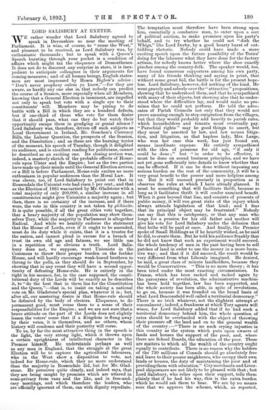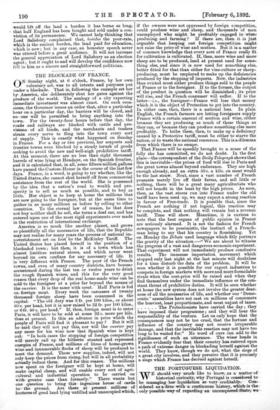LORD SALISBURY AT EXETER.
WE rather wonder that Lord Salisbury agreed to speak in Devonshire so near the meeting of Parliament. It is wise, of course, to " rouse the West," and pleasant to be received, as Lord Salisbury was, by enthusiastic thousands ; but to speak with a Queen's Speech bursting through your pocket is a condition of affairs which might tax the eloquence of Demosthenes. It does not do to discount any surprise in store, it is inex- pedient to anticipate colleagues in their arguments for coming measures ; and of all human beings, English states- men are most impressed by Hosea Biglow's advice : " Don't never prophesy onless ye know,"—for they are aware, as hardly any one else is, that nobody can predict the course of a Session, more especially when all Members, knowing that a General Election is imminent, are impelled not only to speak but vote with a single eye to their constituents' will. Members may be pining to do battle with a Bill in which they see a hundred defects, but if one-third of those who vote for them desire that it should pass, what can they do but watch their opportunity escape them in grudging or genial silence ? Lord Salisbury was, therefore, driven off such subjects as Local Government in Ireland, Mr. Goschen's Currency Bills, the Labour Question, the prospects of the Session, and the Dissolution ; and as these are the burning topics of the moment, his speech of Tuesday, though it delighted its audience, and is excellent reading for politicians, cannot be described as an exciting one. Its closing section was, indeed, a masterly sketch of the probable effects of Home- rule upon Ulster and the Empire; but as the two parties have made up their minds until the General Election arrives, or a Bill is before Parliament, Home-rule excites no more enthusiasm in popular audiences than the Moral Law. It was clever, too, of Lord Salisbury to point out that in Rossendale the Unionist vote had risen 5 per cent., and that as the Election of 1885 was carried by Mr. Gladstone with a total majority of only 200,000, a similar increase in all constituencies might give Unionists a majority again; but then, there is no certainty of the increase, and if there were, the vote in this country is not taken by ple'biscite. It is quite possible, if all the great cities vote together, that a heavy majority of the population may show them- selves Tory, while the majority in Parliament is altogether Radical. And while we heartily endorse the statement that the House of Lords, even if it ought to be amended, must do its duty while it exists, that it is a trustee for the nation, and cannot plead in excuse for a breach of trust its own old age and fatness, we see little use in a repetition of so obvious a truth. Lord Salis- bury does not, we suppose, want Unionists in the Commons to throw their proper burden on the feebler House, and will hardly encourage weak-kneed brethren to throng to the polls, as they should do in September, by showing that in any event they will have a second oppor- tunity of defeating Home-rule. He is entirely in the right in his menace, for, in the case supposed, the consti- tutional duty of the Lords will be exactly as he describes it, to " do the best that in them lies for the Constitution and the Queen,"—that is, to insist on taking a national vote on Mr. Gladstone's special plan, whatever it is ; but, after all, our mastering desire is that Home-rule should be defeated by the body of electors. Eloquence, to do permanent good, must rouse them to a sense of their responsibilities for the Empire ; and we are not sure that a brave attitude on the part of the Lords does not slightly lessen the voters' sense that if a Kingdom is flung away by their votes, it is themselves, and no others, whom history will condemn and their posterity will curse. To us, by far the most attractive thing in the speech is the light, the very strong light, which it throws upon a certain uprightness of intellectual character in the Premier himself. He understands perhaps as well as any man in England, that the struggle at the great Election will be to capture the agricultural labourers, who in the West show a disposition to vote, not indeed for Home-rule, which they no more understand than the majority in Rossendale did, but for Mr. Glad- stone. He perceives quite dearly, and indeed says, that they are being caught by promises which are uttered in semi-privacy from vans and the like, and in free-and- easy meetings, and which therefore the leaders, who are officially ignorant of them, can with dignity repudiate. The temptation must therefore have been strong upon him, essentially a combative man, to enter upon a sort of political auction, to make promises upon his party's behalf, and to try whether he could not " dish the Whigs," like Lord Derby, by a good hearty burst of out- bidding rhetoric. Nobody could have made a more exciting speech upon the future possibility of the Tories' doing for the labourer what they have done for the factory artisan, for nobody knows better where the shoe exactly pinches among the country-folk. The speaker would, too, have found numerous supporters among his own party, many of his friends thinking and saying in print, that without some great bid, the battle is for the present hope- less. Lord Salisbury, however, did nothing of the kind. He went gravely and soberly over the " attractive " propositions, showing that he understood them, and that he sympathised with many of their objects, but showing also that he under- stood where the difficulties lay, and would make no pro- mises that he could not perform. He told the advo- cates of Parish Councils not only that they would not prove amusing enough to stop emigration from the villages, but that they would probably add heavily to parish rates, which householders and tenants must eventually pay. " Parochial rights " may be good things to assert, but they must be asserted by law, and law means litiga- tion, and litigation, as that hapless lady, Mrs. Large, who won her case this week, has just found out, means inordinate expense. He entirely sympathised with the idea of pensions for old age, " if only it could be done ; " but " in order to be effective, it must be done on sound business principles, and we have not yet gone sufficiently into details to know whether that can be effected. If it can be done without imposing any serious burden on the rest of the community, it will be a very great benefit to the poorer and more helpless among us. But it will succeed precisely in proportion as it observes the rules at which I have already glanced. It must be something that will facilitate thrift, because so long as it facilitates thrift it will confer unmixed benefit. When it goes beyond that line, and consists of presents of public money, it will run great risks of the injury which always attends legislation of that kind; and I fear that its principal object may be frustrated." Nobody can say that this is catchpenny, or that any man who longs for a pension for his old father and mother will give his vote for Lord Salisbury under the delusion that that bribe will be paid at once. And finally, the Premier spoke of Small Holdings as if he heartily wished, as he said he did, to create them. But he told his audience frankly that he did not know that such an experiment would succeed, the whole tendency of men in the past having been to sell patches of land in order to use the money in a more lucra- tive way ; and that if it did succeed, the result would be very different from what Liberals imagined. He desired, he said, a great class of minute landholders, because they would be Conservatives. " This is no mere theory; it has been tried under the most exacting circumstances. In France, which has been racked and racked again by the paroxysms of revolution, the administrative machine has been held together, law has been supported, and the whole society has been able, in spite of revolutions, to go on, because it was founded on the broad basis of what Lord Beaconsfield well called a territorial democracy." There is no trick whatever, not the slightest attempt at concealment ; indeed, a frankness at which Tory agents will wince, for Lord Salisbury added that if he had such a territorial democracy behind him, the whole question of rates should be overhauled with the object of throwing their pressure off the land and on to the general wealth of the country :—" There is no such crying injustice in this country as the system which puts upon owners of lands and houses the support of the poor, and, where there are School Boards, the education of the poor. These are matters to which all the wealth of the country ought equally to contribute. There is no reason why the holders of the 750 millions of Consols should go absolutely free and leave to their poorer neighbours, who occupy their own lands or houses, the duty of maintaining the poor and of providing them with education." City merchants and Liver- pool shipowners are not likely to be pleased with that ; but Lord Salisbury, who relies upon their support, tells them plainly that if he had his way, this is the extra burden which he would ask them to bear. We are by no means sure that we approve the scheme, which, as reported, would lift off the land a burden it has borne so long, - that half England has been bought and sold under a con- viction of its permanence. We cannot help thinking that Lord Salisbury complained that, besides the poor-rate, which is the ancient burden, the land paid for education, which is new ; but in any case, an honester speech never was uttered before a great audience. It will not increase the general appreciation of Lord Salisbury as an election agent; but it ought to and will develop the confidence now felt in him as a sincere and straightforward politician.







































 Previous page
Previous page